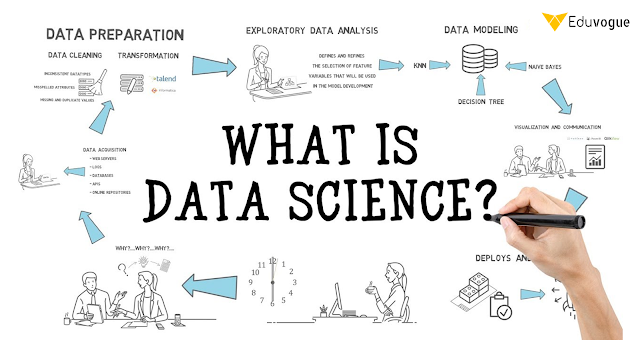What is Data Science?
Data Science is a blend of various tools, algorithms, and machine learning principles with the goal to discover hidden patterns from the raw data. How is this different from what statisticians have been doing for years?
The answer lies in the difference between explaining and predicting.
Data science continues to evolve as one of the most promising and in-demand career paths for skilled professionals. Today, successful data professionals understand that they must advance past the traditional skills of analyzing large amounts of data, data mining, and programming skills. In order to uncover useful intelligence for their organizations, data scientists must master the full spectrum of the data science life cycle and possess a level of flexibility and understanding to maximize returns at each phase of the process.
Data Science – The Discovery of Data Insight
This perspective of data science is all about uncovering conclusions from data. Diving in at a granular level to mine and understand complex behaviors, trends, and inferences. It's about surfacing hidden insight that can help enable companies to make smarter business decisions. For example:
Netflix data mines movie viewing patterns to understand what drives user interest, and uses that to make decisions on which Netflix original series to produce.
Target identifies what are major customer segments within its base and the unique shopping behaviors within those segments, which helps to guide messaging to different market audiences.
Proctor & Gamble utilizes time series models to more clearly understand future demand, which helps plan for production levels more optimally.
How do data scientists mine out insights? It starts with data exploration. When given a challenging question, data scientists become detectives. They investigate leads and try to understand patterns or characteristics within the data. This requires a big dose of analytical creativity.
Then as needed, data scientists may apply the quantitative technique in order to get a level deeper – e.g. inferential models, segmentation analysis, time series forecasting, synthetic control experiments, etc. The intent is to scientifically piece together a forensic view of what the data is really saying.
This data-driven insight is central to providing strategic guidance. In this sense, data scientists act as consultants, guiding business stakeholders on how to act on findings.
Data science – development of data product
A "data product" is a specialized asset that: (1) utilizes data as input, and (2) processes that data to return algorithmically-generated results. The typical example of a data product is a suggestion engine, which ingests user data, and makes personalized suggestions based on that data. Here are some examples of data products:
Amazon's support engines suggest items for you to buy, prepared by their algorithms. Netflix suggests movies to you. Spotify promotes music to you.
Gmail's spam filter is a data product – an algorithm behind the scenes processes incoming mail and determines if a message is junk or not.
Computer concept used for self-driving cars is also data product – machine learning algorithms are ready to recognize traffic lights, other cars on the road, pedestrians, etc.
This is separate from the "data insights" part above, where the result to that is to possibly provide advice to an administrator to make a smarter business arrangement. In contrast, a data product is a technical functionality that encapsulates an algorithm and is designed to integrate directly into core applications. Respective examples of applications that incorporate data product behind the scenes: Amazon's homepage, Gmail's inbox, and autonomous driving software.
Data scientists play a central role in developing data products. This includes building out algorithms, as well as testing, science, and technical deployment into generation systems. In this sense, data scientists serve as technical developers, building assets that can be leveraged at a wide scale.
Some of the opportunities and roles in data science are:
Data analyst
A data analyst is consigned with the efficiency of mining huge
amounts of data, look for patterns, associations, trends and so and come up
with compelling visualization and reporting for analyzing the data to take
business determinations.
Data engineer
The data engineer is entrusted with the responsibility of working with large amounts of data. He should be available to clear data cleansing, data extraction, and data equipment for data business for working with large amounts of data.
Data engineer
The data engineer is entrusted with the responsibility of working with large amounts of data. He should be available to clear data cleansing, data extraction, and data equipment for data business for working with large amounts of data.
Machine
learning expert
The machine learning expert is the one who is working with the various machine learning algorithms like regression, clustering, indexing, judgment tree, random forest and so on.A data scientist is the one who works with huge expenses of data to come up with compelling business insights throughout the deployment of various tools, methods, methodologies, algorithms.









Interesting article.
ReplyDeleteData Science Online Training
Elinize sağlık, sade ve anlaşılır anlatmışsınız.
ReplyDelete